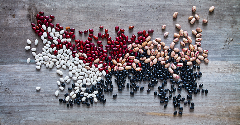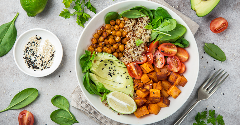News
Cargill reduces saturated fats
5 May 2016Using starches, vegetable waxes and emulsions, Cargill scientists have created fat systems that lower saturated fat by as much as 40% in shortenings, the company claims, without compromising finished product attributes.

Using starches, vegetable waxes and emulsions, Cargill scientists have created fat systems that lower saturated fat by as much as 40% in shortenings, the company claims, without compromising finished product attributes. Cargill researchers presented the three novel approaches to reducing saturated fat in bakery applications this week during the American Oil Chemists’ Society annual meeting.
“This research demonstrates a significant leap forward in our understanding of the structure and function of fats throughout the bakery process,” said Serpil Metin, principal scientist, Cargill. “With that knowledge, we are working to unlock new low-fat and reduced-saturated-fat solutions that meet the needs of bakeries and help address the health concerns of consumers.”The need for alternatives is clear, the company said. The recently released 2015-2020 Dietary Guidelines for Americans recommend consumers limit saturated fat consumption to less than 10% of daily calories. Historically, many foods relied on solid fat, either in the form of trans fat or saturated fat, for structure and stability.Food companies have significantly eliminated trans fats, relegating structuring capacity almost exclusively to saturated fats, Cargill said, noting that health concerns also surround saturated fats, sparking widespread interest in developing alternate structuring elements. Developing and commercialising reduced-saturated-fat shortenings that deliver the right combination of functionality, cost and label-friendly ingredients has proven difficult, according to the company.Before tackling the challenge of reducing saturated fat levels in bakery shortenings, Cargill researchers gained a comprehensive understanding of how fat behaves at a molecular level. They analysed its structure at each stage of the production process, from mixing to the end of a product’s shelf life. Then, they created bakery models to predict the specific application performance of each reduced-saturated-fat alternative. In the end, the researchers landed on three promising approaches to lower saturated fat levels.In one method, Cargill researchers replaced some of the traditional saturated fat with a blend of canola oil, a product lower in saturated fat, and starch. Using particle stabilisation technology combined with fat crystal optimization, the researchers created a structured fat system that reduced saturated fat levels by 40 percent compared to the same source fat without sacrificing key performance characteristics. In addition, depending on the reduced-saturated-fat levels, the resulting functional bakery shortenings had fewer total fat and calories.In a separate study, Cargill researchers focused on controlling how fat solidifies. As fat cools, it forms crystals. The researchers found that by combining vegetable waxes and monoglycerides with canola oil and palm stearin, they could influence the size, shape and speed at which those crystals form. The resulting fat system lowered saturated fat levels, while maintaining critical fat structures.A final approach explored using emulsions to dilute saturated fat levels. While water and fat naturally separate, Cargill researchers devised a method of encasing water droplets in shells made of monoglycerides and hard fats.Cargill said the teams found positive results with each approach to reducing saturated fats. The researchers were able to create fat systems that reduced saturated fat levels by 40 percent, yet still provided performance comparable, and in some cases superior, to that of commercial shortenings.In other research presentations at the AOCS meeting, company scientists proposed new methods to analyse wax esters in vegetable oils and to measure oxidation in oils as well as an oxidation model for predicting oxidative stability of oil blends. For the food industry, this research offers additional tools to aid in formulating healthier consumer products.“We continue to invest in industry-leading research with a goal of developing healthier fats and oils without compromising the flavour, texture, shelf life or consistency of the end products,” said Bob Wainwright, innovation lead, Cargill. “While we’re still several years away from introducing commercial products based on this research, each of these approaches offers a promising avenue toward achieving high performance, lower saturated fat bakery products.”Related news

Sustainable grains present a healthy growth opportunity
3 Oct 2024
Food insights provider SPINS unveils the latest trends in the sustainable grains field, exploring how seven leading grains show healthy growth despite challenges in the global value chain.
Read more
New environmental food scoring standards emerge
30 Sep 2024
EIT Food and Foundation Earth collaborate to launch environmental food scoring for products entering the global supply chain.
Read more
Africa progresses with food transformation strategy
19 Sep 2024
Large-scale efforts are underway to drastically change the African food sector with a $61 billion (€55 bn) set of proposed transformation plans to be implemented across forty countries. Yet there are concerns that this initiative severely jeopardises s...
Read more
Diestel is first turkey producer to snag Regenifed certification
17 Sep 2024
In the US, Diestel Family Ranch, a family-owned turkey farming venture, has become the first producer to gain Regenified certification for its whole turkey and processed turkey product ranges.
Read more
Upside Foods sues Florida over cultivated meat ban
10 Sep 2024
In May, Florida became the first US state to ban cultivated meat's sale, manufacture, and distribution. Upside Foods, a cultivated chicken startup, has filed a federal lawsuit in response, arguing that the law is unconstitutional.
Read more
European consumers want more freedom to choose biotech-based food
3 Sep 2024
Survey findings point to growing levels of interest in cultivated meat as European consumers say they want the freedom to choose the lab-based products.
Read more
How alternative proteins could transform US agriculture and restore natural ecosystems
30 Aug 2024
As the US seeks new strategies to meet its environmental targets, a recent report from the Good Food Institute (GFI) and Highland Economics highlights the potential of alternative proteins to drive significant progress.
Read more
How insecure are our global food systems?
29 Aug 2024
Countries across the globe are struggling to secure safe and accessible food, according to recent reports.
Read more
Austria’s new dietary guidelines recommend less animal protein and more plants
23 Aug 2024
Austria's dietary guidelines have been updated to reflect health and climate parameters. Both an omnivorous food pyramid and a vegetarian version are included, marking the first time a separate pyramid for vegetarians is provided.
Read more
Will ‘foie gras’ become the EU’s first approved cultivated meat?
20 Aug 2024
French startup Gourmey has submitted its cultivated foie gras for approval in the European Union (EU), signalling the first application of its kind in the region.
Read more